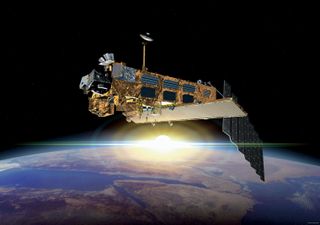So far there has been no effect on the satellite s routine operations.
Space junk hitting satellites solar panel.
After the launch of sputnik 1 in 1957 the north american aerospace defense command norad began compiling a database the space object catalog of all known rocket launches and objects reaching orbit.
It was a 40 centimetre of damaged area on one of the solar panels and the size of impact object was no more than few millimetres.
Had the debris been any larger the whole solar panel would have shattered.
The first is that this debris could hit spacecraft carrying humans or even the international space station.
The spacecraft had been hit by a piece of space debris.
Steps being taken to prevent accidents from space debris.
Space debris began to accumulate in earth orbit immediately with the first launch of an artificial satellite into orbit in 1957.
Being hit by a sugar cube of space debris is the equivalent of standing next to an exploding hand grenade.
Skylab was the first united states space station launched by nasa occupied for about 24 weeks between may 1973 and february 1974.
Skylab 2 skylab 3 and skylab 4 major operations included an orbital workshop a solar observatory earth observation and hundreds of experiments.
Communications satellite kosmos 2251 struck the solar panel of iridium 33 a.
Unable to be re boosted by the space shuttle which was.
And finally the esa warns that large.
It was operated by three separate three astronaut crews.
Humans have been sending.
Space junk has been amassing since the first human made satellite sputnik 1 escaped earth s gravitational pull on october 4 1957.
Another risk is satellites hitting each other.
Chunks of solar panels old rocket bodies dead satellites and chips of paint smaller than a fingernail they re all whizzing around at up to 17 500 mph in space.
Satellites protective shields and upper stages of.
Esa engineers have discovered that a solar panel on the copernicus sentinel 1a satellite was hit by a millimetre size particle in orbit on 23 august.
The european space agency reports that one of its satellites the sentinel 1a weather satellite was hit by a small piece of debris that tore a hole through one of the its solar panels.

